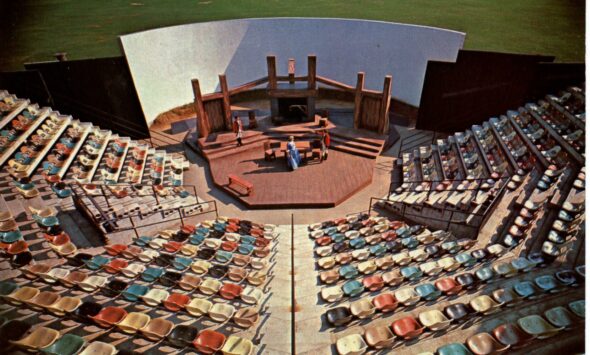
A postcard showing the Antioch Amphitheater just after it had been built, with a wooden stage and multi-colored, plastic seats, which were factory seconds. (Photo courtesy of Dave Neuhardt)
A timeline of theater in Yellow Springs
- Published: November 16, 2022
The following article appeared in the 2021–22 Guide to Yellow Springs: A Kaleidoscopic View of the Village. Click here to read more articles from that year’s guide.
“This is a town that has never been bothered with shows — it looks rather dull.”
So wrote an “advance man” who came into the village in 1873 to drum up interest in “Magner & Co’s Great Moral Sensation Show of the Season,” according to a document shared with the News by villager and Yellow Springs Historical Society President Dave Neuhardt.
History tells a different story about Yellow Springs — one about a town that’s had a long, sometimes fraught, but always loving relationship with the theater.
The YS Opera House
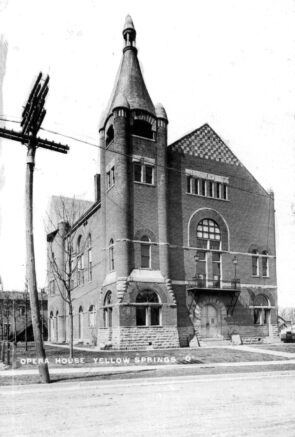
Constructed in 1891, the Yellow Springs Opera House sat at the corner of Winter and Dayton streets. It was demolished in 1960. (Photo courtesy of Dave Neuhardt)
Yellow Springs’ theater timeline begins in earnest in 1891, when construction of the Yellow Springs Opera House was completed at the corner of Winter and Dayton streets. It was one of many such buildings that sprang up in small towns around Ohio in the late 19th century due to Ohio legislation that allowed villages and townships to issue levies to fund town hall buildings. The building featured town hall offices downstairs and an auditorium upstairs. Just months after opening, the Opera House staged its first production in November of 1891: “The Drummer Boy of Shiloh,” penned in 1870 by Ohio native Samuel Muscroft, which follows a young boy who runs away to join the army during the Civil War and dies in support of the Union cause.
In the 1930s, the Opera House became the home of the YS Summer Players and the Antioch Players. By 1945, the town and gown had joined forces as the YS Area Theatre. These were the foundational years of the proverbial golden age of theater in the village, with Antioch professors Meredith Dallas, Arthur Lithgow — father of actor John Lithgow — and Paul Treichler at the helm.
The Opera House had begun to show its age by that point, and was also plagued by a curious infestation. Writing for the New Yorker in 1954, Paul Rohmann recalled: “An energetic bat was circling the theatre. … Round and round he went, louder and louder spoke the actors, while the audience sat pivoting their heads like spectators at an air race.”
By 1949, the YS Area Theatre was producing both a winter and summer season, running plays almost continuously — but this would be the last year that the company would be based at the Opera House. According to News archives, the last show for the company at the Opera House was “The Wise Have Not Spoken,” by Paul Vincent Carroll, directed by famed British actor and director Basil Langton; at the time, Langton was married to Louise Soelberg, who would go on to establish the Riding Centre.
The auditorium’s balcony was condemned that year, and though municipal offices still operated downstairs, no further productions were mounted upstairs. Antioch College considered leasing the theater from the Village in order to justify putting money into repairing the rapidly deteriorating building, but declined to do so. After years of trying to decide how to save the historic structure, the Village ultimately decided against it — and the building was demolished in 1960.
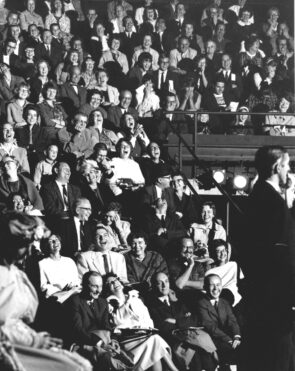
The audience erupts in laughter during a 1963 performance of “Charley’s Aunt” at Antioch Amphitheater. (Photo by Axel Bahnsen, Courtesy of Tony Dallas)
Antioch Area Theater and Shakespeare Under the Stars
The loss of the Opera House was not the loss of theater in Yellow Springs, however — in fact, its most historic era had just begun. In the summer of 1952, Dallas and Lithgow produced the first Shakespeare Under the Stars festival, to incredible success. As written in the July 10, 1952, issue of the News: “[the festival] is drawing nationwide attention to Yellow Springs and may make this village a tourist mecca of no small proportions by August.” The newly crowned Queen Elizabeth II, who had ascended to the throne of England earlier that year, sent a letter of commendation to the festival. The Antioch Area Theatre, as it was now known, would produce all 38 of Shakespeare’s plays with both local and nationally known professional actors, holding the final summer festival in 1958.
In 1955, the Antioch Area Theatre made its temporary home in a campus building that had previously housed the foundry that became Morris Bean — now known as the Foundry Theater.
After the Shakespeare series ended, Dallas continued to produce at least five plays a year at Antioch with professional actors. To keep up with the growth and popularity of the program, the college built the Antioch Amphitheater in 1961. As Tony Dallas recounted in an interview, the theater’s nearly 600 seats were installed by village kids — including himself.
“The seats were fiberglass, this new material — they were factory rejects, so they were sort of multicolored, [placed] randomly,” he said. “Yellow Springs was the hub of artistic activity in southern Ohio — especially in theater.”
By the 1970s, however, Meredith Dallas had retired, and the college struggled more and more to support the theater program financially. The program closed in 1984, but reopened in 1991 after student protests, and continued in 1994 under the direction of Antioch alumna Louise Smith until the college’s 2008 closure. In 2014, three years after the college reopened, the theater program moved into the Foundry Theater, where it continues to hold student productions.
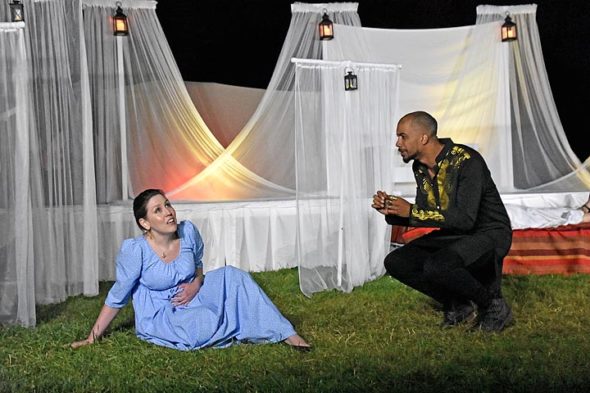
Kayla Graham as Emilia and Elias Kelley as Othello in the YS Theater Company’s 2019 Summer Shakespeare Shindig production of “Othello.” The play was the fourth production in the annual summer series, which aimed to bring The Bard back to the village in homage to the famed Antioch Shakespeare Festival, this time as community theater. (Photo by Luciana Lieff)
Center Stage and YS Theater Company
While the ’70s and ’80s may have seen the end of professional theater in the village, those decades saw the emergence of a robust era of community theater with the birth of Yellow Springs Center Stage in 1971.
The Antioch Area Theater had braved all the plays of Shakespeare, but Center Stage took a different tack, bringing popular theater to village audiences by mounting all the comic operas of Gilbert and Sullivan, directed by Jean Hooper. As Rebecca Eschliman, a longtime Center Stage member, wrote in the YS Historical Society blog: “The run of Gilbert and Sullivan started in 1972, the second summer of Center Stage’s existence in John Bryan Community Center with a production of ‘The Mikado’ and finished in the summer of 1987 with a production of ‘The Grand Duke.’ … In between those two productions every summer was a much-anticipated production of every other Gilbert and Sullivan operetta, with particular favorites ‘The Mikado’ and ‘Pirates of Penzance’ given revivals.”
Center Stage moved into a space on Dayton Street in 1975 — the space now occupied by Rose & Sal Co. Mercantile — building a black box theater space that would host not only its own productions, but also those of other groups. The company produced at least a half-dozen shows each year until the ’90s.
By 1995, both the company and the community at large had begun to slow its use of the Dayton Street space. As reported by the News in 2003: “Center Stage has struggled for a little over five years to attract directors and local support to continue producing quality shows. [Jean Hooper] and other board members said that times have changed and local residents don’t participate in small community theater the way they once did.”
On Aug. 3, 2003, the Center Stage board voted to relinquish occupancy of the building and to sell off all its assets.
As Hooper told the News: “It’s been a lot of fun, and it is with regret that we’re closing … but I think it’s O.K. It’s been a reasonable run, and not a whole lot of theaters make it that long.”
In 2011, villager Kay Reimers revived Center Stage, and the local volunteer company brought community theater to life again with shows like “Threepenny Opera” and “The Crucible.” The new Center Stage ended its run in 2014, and the YS Theater Company took up the community theater mantle that same year, continuing to mount several productions each year, including the 10-Minute Play Festival, which was originally founded by Reimers and the late Virgil Hervey during the revival of Center Stage.
In a nod to both Center Stage and Antioch Area Theatre before it, the YS Theater Company honored The Bard and community theater by bringing Shakespeare back to the village in 2016 with its first Summer Shakespeare Shindig production, “Much Ado About Nothing.” That production was staged on the lawn outside Antioch Hall by the company’s creative director, Lorrie Sparrow-Knapp. Subsequent Summer Shakespeare Shindig productions — “Julius Caesar” in 2017, “A Midsummer Night’s Dream” in 2018 and “Othello” in 2019 — were held on the grounds of Mills Lawn. Though the company halted productions in 2020 due to the pandemic, the 10-Minute Play Festival — this time staged outside — returned in the summer of 2021.
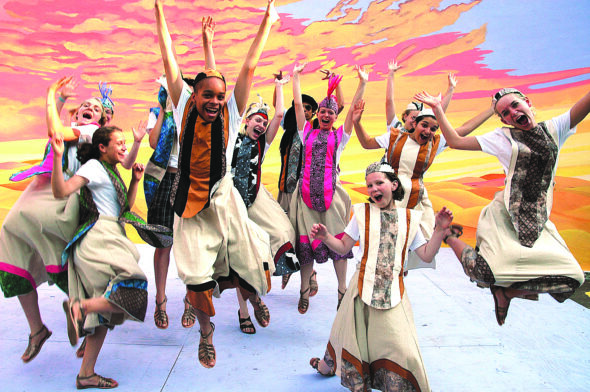
YS Kids Playhouse produced innovative youth theater for adults and children alike. Above, The Conference of Birds, 2010, was an adaptation of a 12th-century fable into an original musical that featured puppets, Persian poetry and elaborate choreography. (Photo by Megan Bachman)
YS Kids Playhouse
As the original Center Stage was taking its final bow, the curtain was rising on a new — and young — theater program: the Yellow Springs Kids Playhouse, or YSKP. The program was founded in 1995 by John Fleming, and immediately set itself apart from other youth theater programs by featuring annual musical productions and plays written especially for the program — which meant that every year, YSKP’s young cast would star in a world premiere at the Antioch Amphitheater, the new home of the program.
YSKP featured plays written by both nationally known and local playwrights, with music overseen by jazz artist Tucki Bailey for many years. The plays sometimes took on historical subjects, and sometimes the mythical and fabulous, and sometimes a mixed bag of zany comedy, politics and heart — and some were more than a little prescient. In summer of 1998, the YSKP premiered “Bonanza Valley!” its fourth summer musical, written by then-chair of the Antioch College theater department Louise Smith and choreographed and directed by Fleming. According to the YS News: “‘Bonanza Valley!’ is a musical western whimsically inspired by [two] popular 1960s television series, ‘Bonanza’ and ‘The Big Valley.’ As the play opens, it’s the last episode of the series and the famous ranch is about to be sold for real estate, unless Heartright and his sons can stop the famous developer, Donald Trumpmall.” Trumpmall’s last words in the play were, “I’m going to run for president!”
John Fleming served as creative director for YSKP until 2014, before passing the torch to Ara Beal. YSKP took a hiatus after its 2017 season, producing no shows in 2019, but returned to the stage in 2019 with a reprise of “Bonanza Valley!”, performing in the Foundry Theater after the Antioch Amphitheater was condemned and closed. The following year, partially in response to the loss of the amphitheater, YSKP announced a new direction: it would now focus its efforts on its new Traveling Tabletop Theater, or TTT, a mobile puppet theater complete with a stage, a sound system and even seating for a few dozen spectators. The TTT’s first show, “The King Stag,” — produced in video format during the pandemic — debuted in February of 2021 on Community Access Yellow Springs.
(After 27 years, the curtains closed on the village’s longest-running theater company. In October 2022, the YSKP took its final bow at the “It’s a Wrap Gala” at the Foundry Theater.)
Theater in the schools
As the YS Area Theatre became Antioch Area Theatre, and as those gave way to Center Stage and then to YSKP, there was one institution that kept producing shows on its own schedule, whenever it could: Yellow Springs Schools. Especially in the years when professional theater was at its height, the productions of the village middle and high schools were given short shrift by the local paper of record — the first mention of a high school production that can be found in the News archives is Bryan High’s production of “Daphne” in 1945, which was given only a few lines.
Things improved in terms of News coverage in 1951, when Jan Lehman wrote a review of Bryan High’s production of “Rest Assured” by Donald Payton. Lehman didn’t pull any punches, writing: “We suggest that the Curtain Pullers depart from the tried and not-so-true collection of high school plays, and try something with a little more punch.”
YSHS and McKinney eventually took this advice to heart, and by the 1980s, were consistently producing spring musicals like “Fiddler On the Roof,” “Big River” and “The Wiz.” In the early ’90s, YSHS began staging its annual one-act plays, with works written, directed and acted by students. These productions had more “punch” than perhaps reviewer Lehman could have predicted: In 2008, the one acts were the cause of controversy when then-school district Superintendent Norm Glismann forbade student Peter Keahey from performing his play, “Cat Calls,” without considerable edits, as Glismann objected to the play’s use of innuendo. The controversy led to a villagewide conversation about censorship in the arts and in the schools; Glismann left his position as superintendent the next year.
YSHS and McKinney continued to mount at least two plays each year until 2020 when, in March of that year, the pandemic forced the young actors to cancel their planned production of “The Fair Maid of the West,” which had already been deep in rehearsals. Not to be deterred, the schools worked around the limitations of the pandemic by releasing a filmed version of their fall production, “Dracula,” in December of 2020; the entire production was rehearsed and staged outdoors on the YSHS Morgan Fields so that the actors and crew could maintain physical distance. The following May, the young thespians returned to the outdoor stage to present “Please Stand By,” a collaboratively written piece that aimed to capture their experiences during the pandemic.
Pointing to her students’ abilities to roll with the punches, YSHS and McKinney Performing Arts Teacher Lorrie Sparrow-Knapp said: “Their growth has been monumental, and if we come out of all this with a strong theater program … then we win. We win the pandemic.” ♦
The Yellow Springs News encourages respectful discussion of this article.
You must login to post a comment.
Don't have a login? Register for a free YSNews.com account.











No comments yet for this article.